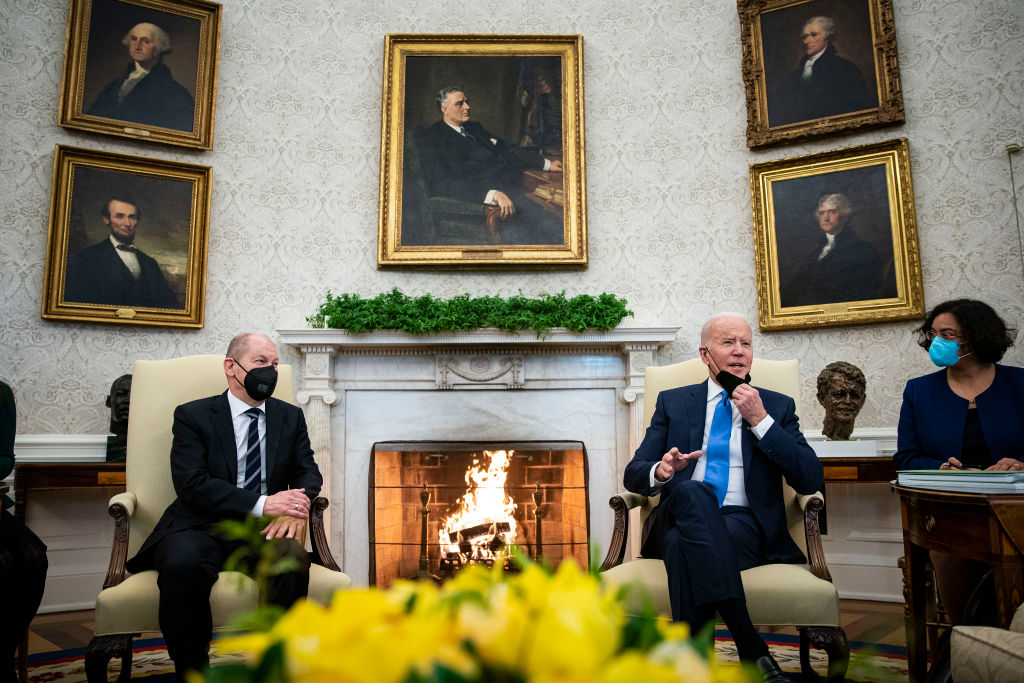Biden says U.S. and Germany are in 'lockstep' on Ukraine during meeting with German chancellor


A free daily email with the biggest news stories of the day – and the best features from TheWeek.com
You are now subscribed
Your newsletter sign-up was successful
President Biden met Monday with German Chancellor Olaf Scholz. Before the closed-door meeting began, the president told reporters the two countries are working "in lockstep" to address the Ukraine crisis, The Guardian reported.
Per The Guardian, "Scholz called it 'an important meeting at an important time' and said the U.S. and Germany [are] working 'intensely' to deter a Russian invasion of Ukraine."
Germany has given the international community plenty of reasons to doubt its commitment to supporting Ukraine.
The Week
Escape your echo chamber. Get the facts behind the news, plus analysis from multiple perspectives.

Sign up for The Week's Free Newsletters
From our morning news briefing to a weekly Good News Newsletter, get the best of The Week delivered directly to your inbox.
From our morning news briefing to a weekly Good News Newsletter, get the best of The Week delivered directly to your inbox.
The head of Germany's navy resigned last month after saying all Russian President Vladimir Putin really wants is "respect" and that it would be "easy to give him the respect he demands, and probably deserves."
Around the same time, the German government pledged, in lieu of weapons, to send 5,000 military helmets to Ukraine, drawing criticism and mockery, The New York Times reported. "The plan is obviously for 5,000 Ukrainian soldiers to run across the border and head-butt the Russian troops deployed there," Ukrainian-born German politician Marina Weisband tweeted.
Germany is a major importer of Russian natural gas and sits at the other end of Russia's Nord Stream 2 pipeline.
On Fox News Sunday, host Martha MacCallum said Germany "has really been on the sidelines in this. They have large energy deals with Russia. They're not giving any lethal aid to Ukraine."
A free daily email with the biggest news stories of the day – and the best features from TheWeek.com
National Security Adviser Jake Sullivan responded that the Biden administration has "been coordinating closely with Germany … on a swift and severe package of sanctions" to be imposed on Russia in the event of an invasion. He also said Germany is "the second-largest donor to Ukraine in Europe," despite German refusal to send weapons, and that "different allies" have "step[ped] up to take different pieces of this."
Grayson Quay was the weekend editor at TheWeek.com. His writing has also been published in National Review, the Pittsburgh Post-Gazette, Modern Age, The American Conservative, The Spectator World, and other outlets. Grayson earned his M.A. from Georgetown University in 2019.
-
 The environmental cost of GLP-1s
The environmental cost of GLP-1sThe explainer Producing the drugs is a dirty process
-
 Greenland’s capital becomes ground zero for the country’s diplomatic straits
Greenland’s capital becomes ground zero for the country’s diplomatic straitsIN THE SPOTLIGHT A flurry of new consular activity in Nuuk shows how important Greenland has become to Europeans’ anxiety about American imperialism
-
 ‘This is something that happens all too often’
‘This is something that happens all too often’Instant Opinion Opinion, comment and editorials of the day
-
 Epstein files topple law CEO, roil UK government
Epstein files topple law CEO, roil UK governmentSpeed Read Peter Mandelson, Britain’s former ambassador to the US, is caught up in the scandal
-
 Iran and US prepare to meet after skirmishes
Iran and US prepare to meet after skirmishesSpeed Read The incident comes amid heightened tensions in the Middle East
-
 EU and India clinch trade pact amid US tariff war
EU and India clinch trade pact amid US tariff warSpeed Read The agreement will slash tariffs on most goods over the next decade
-
 Israel retrieves final hostage’s body from Gaza
Israel retrieves final hostage’s body from GazaSpeed Read The 24-year-old police officer was killed during the initial Hamas attack
-
 China’s Xi targets top general in growing purge
China’s Xi targets top general in growing purgeSpeed Read Zhang Youxia is being investigated over ‘grave violations’ of the law
-
 Panama and Canada are negotiating over a crucial copper mine
Panama and Canada are negotiating over a crucial copper mineIn the Spotlight Panama is set to make a final decision on the mine this summer
-
 The rise of the spymaster: a ‘tectonic shift’ in Ukraine’s politics
The rise of the spymaster: a ‘tectonic shift’ in Ukraine’s politicsIn the Spotlight President Zelenskyy’s new chief of staff, former head of military intelligence Kyrylo Budanov, is widely viewed as a potential successor
-
 Why Greenland’s natural resources are nearly impossible to mine
Why Greenland’s natural resources are nearly impossible to mineThe Explainer The country’s natural landscape makes the task extremely difficult
